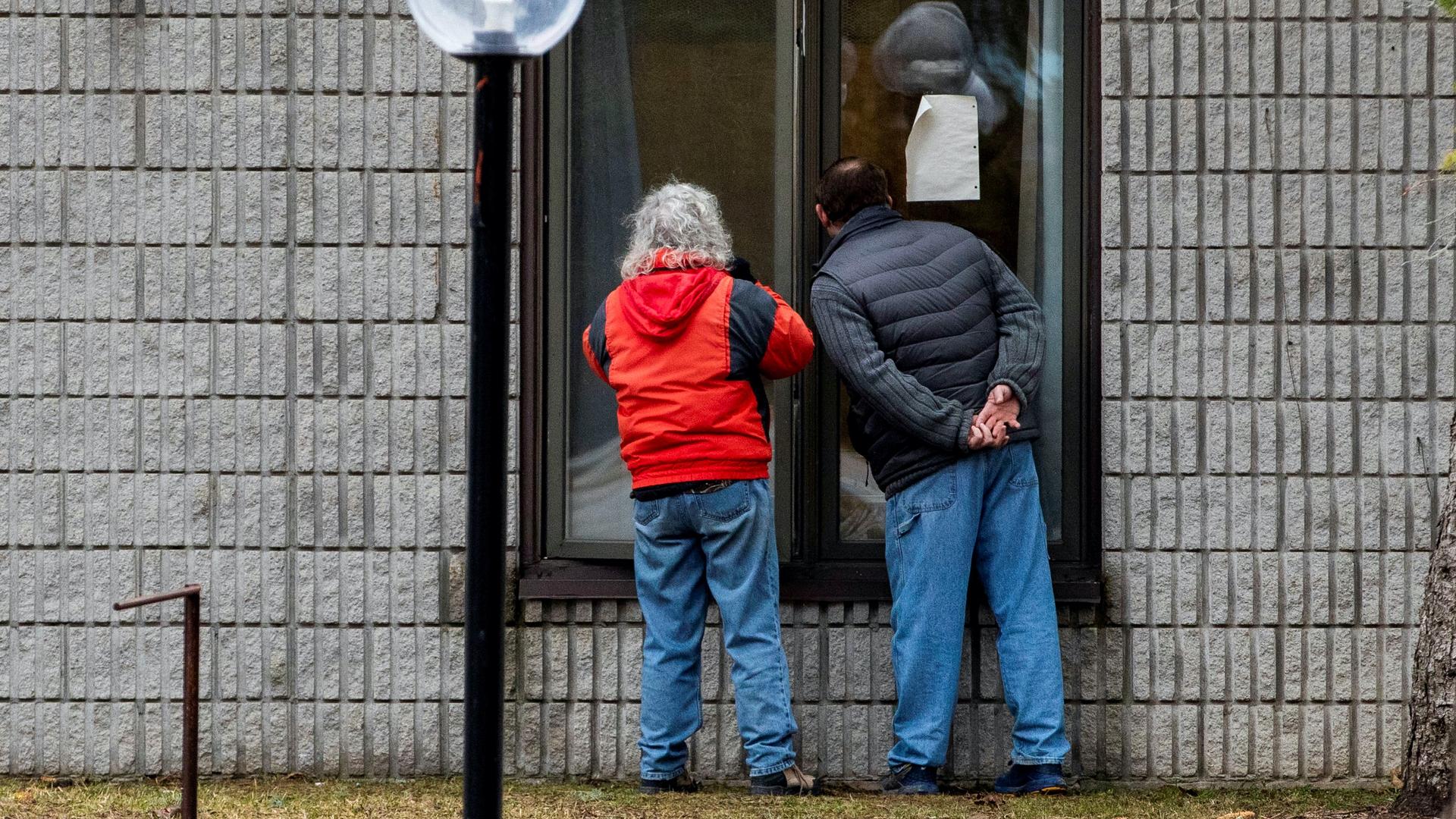Bonnie Wilson’s 92-year-old mother, Elsie Jackson, moved into a nursing home in the Toronto area about eight years ago. Jackson has dementia and suffers from chronic pain. But she was still stylish, cheerful, and had her hair done the last time Wilson saw her in person, during a March 3 visit to the home, which is called Value Village.
She was “looking forward to participating in life,” Wilson said.
Then the coronavirus outbreak hit Canada.
Related: Coronavirus tears through Canada nursing homes
Nursing homes were hit especially hard, and to protect residents, provincial governments issued lockdown measures and shut out families. But some experts argue this kind of confinement can do more harm than good as some residents’ conditions deteriorate from the isolation.
Bonnie Wilson says she watched helplessly as her mom’s physical and mental health deteriorated. Most nursing homes were short-staffed, including the one where Wilson’s mother lives. Confined to her room, her problems with chronic pain worsened. The only way to see each other was through weekly video chats.
“We’re now at a point where she won’t even go have a shower. She won’t come out of her room. She won’t get her hair washed. It’s a combination, I believe, of her being in pain, feeling sick, and despondency. She doesn’t want to live.”
“Being isolated, not having anything to look forward to, with no end date in sight, certain things started to go awry,” said Bonnie Wilson from her home in Orono, Ontario. “We’re now at a point where she won’t even go have a shower. She won’t come out of her room. She won’t get her hair washed. It’s a combination, I believe, of her being in pain, feeling sick, and despondency. She doesn’t want to live.”
Related: Netherlands nursing home builds ‘glass cabin’ for safe visits
Nursing homes across Canada have recently started to open their doors to family visits. Experts are starting to lobby governments to expedite these reopenings.
Dr. Samir Sinha, director of geriatrics at Mount Sinai Hospital in Toronto, supported the initial lockdown. He saw a few weeks of lockdown as “a necessary evil,” reasoning that “it’s not going to be great but [that] we have to weigh risks and benefits.”
But he says regular family visits are often what keep nursing home residents mentally and physically healthy. And he’s concerned about increasing evidence that separating families for more than a few weeks is hurting residents.
“We’re seeing issues of undernourishment. We’re seeing increasing issues of loneliness, depression that comes with that level of social isolation. And we’re seeing increasing behavioral issues and people just deteriorating as a result.”
“We’re seeing issues of undernourishment. We’re seeing increasing issues of loneliness, depression that comes with that level of social isolation. And we’re seeing increasing behavioral issues and people just deteriorating as a result,” he said.
He points to a report from one nursing home in France, where infectious disease experts found that more people died because of undernourishment than the coronavirus. He says solid statistics are hard to come by, but he suspects they’ll eventually show neglect during the confinement caused many nursing home deaths.
“We may have the same numbers of people who may have died from loneliness, social isolation, dehydration and malnutrition as actually died from COVID-19 itself,” he said.
Sinha is pushing provincial governments in Canada to allow nursing homes to open their doors to unlimited family visits, but many are still reluctant to take that step.
John Yip, who runs the Kensington Gardens nursing home in downtown Toronto, says he’s facing an impossible dilemma. “It’s a very complicated situation. Tough, tough call. There’s no easy answers here,” he said.
Related: Detroit needs Canadian nurses. But coronavirus threatens their travel.
Like other nursing homes in Ontario, Kensington Gardens allowed the first indoor family visits last week. The visits are limited to once per week for up to 30 minutes, and everyone has to wear a mask and keep their distance.
Wilson, whose mom is in a different home, says she still won’t be able to give her mom the care she needs.
“Under those rules, I can’t help her with anything,” she said. “We can’t touch each other. I can’t assist her. I’m not able to do anything other than say hello. That’s not enough when we have people that need attention.”
Yip said he understands families’ concerns. He has also seen residents deteriorate mentally and physically during the lockdown, but he still doesn’t want to risk another coronavirus outbreak, he said. At Kensington Gardens, eight residents died of COVID-19 in a single week, and his staff was forced to deal with the emergency situation.
“Our staff, who don’t bag bodies, were bagging people they had cared for years. … That sticks with me. There’s trauma there.”
He and his staff are still haunted by the experience: “Our staff, who don’t bag bodies, were bagging people they had cared for years. Not in black body bags but transparent plastic ones, and with a sharpie would write on the bag the name, time, and roll that body bag through the unit,” he said. “That sticks with me. There’s trauma there.”
Under current government rules, any home with even one new case of COVID-19 will have to confine residents and prevent all visits until the home is coronavirus-free. Yip says no one wants to see that happen again.
The story you just read is accessible and free to all because thousands of listeners and readers contribute to our nonprofit newsroom. We go deep to bring you the human-centered international reporting that you know you can trust. To do this work and to do it well, we rely on the support of our listeners. If you appreciated our coverage this year, if there was a story that made you pause or a song that moved you, would you consider making a gift to sustain our work through 2024 and beyond?
